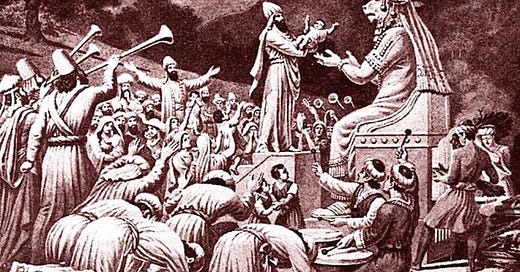Any time we read about Jesus healing someone’s daughter, I can’t help but think of Amelia. Please pray for her, the way the Canaanite woman does in today’s Gospel.
Reading 1
1 Kgs 11:4-13
When Solomon was old his wives had turned his heart to strange gods, and his heart was not entirely with the LORD, his God, as the heart of his father David had been. By adoring Astarte, the goddess of the Sidonians, and Milcom, the idol of the Ammonites, Solomon did evil in the sight of the LORD; he did not follow him unreservedly as his father David had done. Solomon then built a high place to Chemosh, the idol of Moab, and to Molech, the idol of the Ammonites, on the hill opposite Jerusalem. He did the same for all his foreign wives who burned incense and sacrificed to their gods. The LORD, therefore, became angry with Solomon, because his heart was turned away from the LORD, the God of Israel, who had appeared to him twice (for though the LORD had forbidden him this very act of following strange gods, Solomon had not obeyed him).
So the LORD said to Solomon: "Since this is what you want, and you have not kept my covenant and my statutes which I enjoined on you, I will deprive you of the kingdom and give it to your servant. I will not do this during your lifetime, however, for the sake of your father David; it is your son whom I will deprive. Nor will I take away the whole kingdom. I will leave your son one tribe for the sake of my servant David and of Jerusalem, which I have chosen."
There’s an old joke—be opened minded, but not so much that your brains fall out.1 That’s what happened to King Solomon.
He was so accepting of other cultures, other religions, that he married pagan women, built altars to their gods, and even burned sacrifices to them. And that’s not just burning some incense; Molech demands child sacrifice. Some believe Solomon might have sacrificed his own child on an altar to a foreign God.
Sir Charles James Napier, a British general in India in the 1800s, had a different attitude when it came to respecting traditions—
"Be it so. This burning of widows is your custom; prepare the funeral pile. But my nation has also a custom. When men burn women alive we hang them, and confiscate all their property. My carpenters shall therefore erect gibbets on which to hang all concerned when the widow is consumed. Let us all act according to national customs."
Responsorial Psalm
PS 106:3-4, 35-36, 37 and 40
R. Remember us, O Lord, as you favor your people.
Blessed are they who observe what is right,
who do always what is just.
Remember us, O LORD, as you favor your people;
visit us with your saving help.
R. Remember us, O Lord, as you favor your people.
But they mingled with the nations
and learned their works.
They served their idols,
which became a snare for them.
R. Remember us, O Lord, as you favor your people.
They sacrificed their sons
and their daughters to demons.
And the LORD grew angry with his people,
and abhorred his inheritance.
R. Remember us, O Lord, as you favor your people.
Living in a non-Christian or secular society can lead us away from God. Getting along with others is not bad, but following their example and worshiping idols, like Solomon, is bad. We must be accepting of other people, not practices, which is exactly what Jesus demonstrates in today’s Gospel.
Alleluia
Jas 1:21bc
R. Alleluia, alleluia.
Humbly welcome the word that has been planted in you
and is able to save your souls.
R. Alleluia, alleluia.
Gospel
Mk 7:24-30
Jesus went to the district of Tyre. He entered a house and wanted no one to know about it, but he could not escape notice. Soon a woman whose daughter had an unclean spirit heard about him. She came and fell at his feet. The woman was a Greek, a Syrophoenician by birth, and she begged him to drive the demon out of her daughter. He said to her, “Let the children be fed first. For it is not right to take the food of the children and throw it to the dogs.”
She replied and said to him, “Lord, even the dogs under the table eat the children’s scraps.”
Then he said to her, “For saying this, you may go. The demon has gone out of your daughter.” When the woman went home, she found the child lying in bed and the demon gone.
First century Jews did, indeed, call gentiles “dogs.” It was not a polite thing to say. But Jesus didn’t actually say “dog” here; the word is better translated as “puppy.” He’s sort of goofing around with the terminology used at the time. It’d be kinda like calling someone a “rascal.” Technically it’s an insult, but I mean, c’mon.
And don’t forget, He called Peter Satan at one point.2 So it’s not like Jesus wouldn’t use strong language to make a point.
God set the Jews aside to be a light for all nations, and that’s eventually where Jesus sprang up, a shoot from Jesse’s tree. Jesus focused His ministry there. But when He sees especially strong faith outside of Judaism, like with the Centurion’s Servant,3 Jesus doesn’t hold back his blessings.
Like them, this woman shows humility, and begs for Jesus’ help. She knows He has the power to cast out demons, when no one else does.
Later, after the Resurrection, Jesus grants this power to the Apostles and their successors, and sends them out into the whole world. The woman doesn’t know that yet, but she still has faith in Jesus.
Solomon lost his faith, but this Syrophoenician woman finds her faith, even while her daughter is possessed by a demon. It’s pretty obvious who we should be modeling ourselves after today.





Amelia's picture here is so nice and she is such a doll. We pray for her daily at our evening meal, especially for healing. We are Matt's parents, Kathie & Bud Fears. Alison is our daughter-in-law., and Toni and Keller are our grandkids. You are an awesome guy and we wish you and your wife, Kirily, the peace of Our Lord.